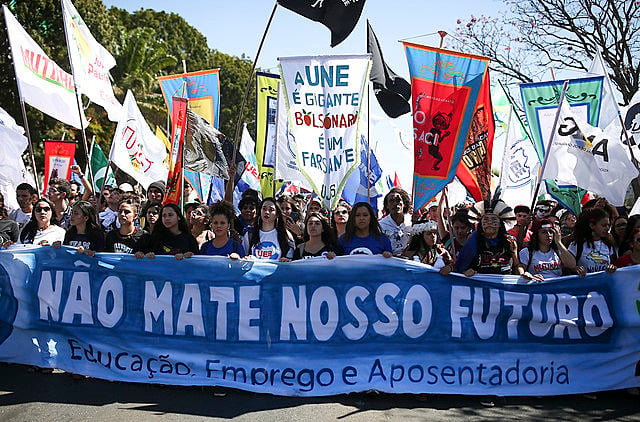Brazil’s National Union of Students (UNE) prepared a schedule of social and institutional mobilization in August to stop Jair Bolsonaro’s government from implementing a program announced last month to promote private investment in public universities, a move student organizations believe will not solve the pressing problem of budget cuts for higher education.
The president of the UNE, Iago Montalvão, argues that there is no way to improve the program itself, called Future-se (which loosely translates to “Future Yourself”).
“Its essence is about attacking the public university, especially regarding social organizations,” he says. “Social organization” is a status granted by the government to private not-for-profit organizations so they can receive tax and budget benefits to conduct their community-oriented operations.
Montalvão, an Economics student from the University of São Paulo, points out that the student organization must defeat the program in Congress, because “if the legislation is passed, the government will start to pressure university presidents, intimidate them, or even appoint officials in order to implement the project.”
Some universities are calling meetings with their boards, the UNE president says, adding that the organization is planning to take the protest to the streets.
“Our strategy is, first, to keep mobilizing on the streets to overturn the [education budget] cuts, but we are also mobilizing lawmakers and social movements, professor unions, association of university presidents. All that is part of the organization process.”
Questions
Introduced on Jul. 17 by Brazil’s Education minister, Abraham Weintraub, and still surrounded by questions, the Future-se program establishes that social organizations will be able to directly run universities, including managing their funds and staff.
A statement published online by the Education Ministry reports that a managing committee “will define the criteria to accept certificates in order to take part in the election process for university president,” which some believe means that these organizations would actually be able to nominate the heads of universities. The government has yet to clarify what it actually means.
By joining the Future-se program, federal higher education institutions could “lend” professors to work for social organizations, as well as grant occupation or naming rights to these organizations.
The announcement of the Future-se program has sparked negative reactions by university presidents and associations of professors of federal higher education institutions in Brazil. A general strike is being called by education activists on Aug. 13.
Dangerous project
Gabryel Henrici, a History student at the Federal University of Rio de Janeiro and the first vice president of the UNE, says Future-se is a “dangerous” project that could mean the end of university autonomy.
“You hand over estate and scientific assets, create a fund at the service of major private banks and private capital companies, and put the very public character of universities at risk,” Henrici says.
The student activist argues that there is contradiction in the government cutting university budgets and then presenting a “solution” that requires private funds.
He also claims that pressuring the Brazilian Congress will be important, but not the most crucial struggle.
“We must win society over to defend a project for public university they [the government] are trying to destroy. That is the crucial pressure. If we just focus on the Congress, we tend to lose,” he adds.
On Sunday, the UNE and 186 student organizations released a statement against the Future-se program, underscoring that it is a covert attempt to privatize public education in Brazil.
In the statement, the organizations accuse the government of promoting “ideological persecution and spreading hatred and lies against universities, federal institutes, schools, teachers, professors, and students.”




